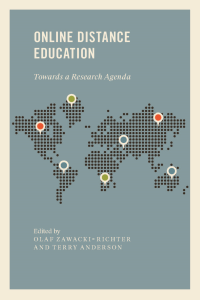
Au Press, Athabasca, 2014
ISBN: 9781927356623 (print), 9781927356630 (pdf), 9781927356647 (epub)
URL: http://aupress.ca/index.php/books/120233
Online Distance Education: Towards a Research Agenda offers a systematic overview of the major issues, trends, and areas of priority in online distance education research. In each chapter, an international expert or team of experts provides an overview of one timely issue in online distance education, summarizing major research on the topic, discussing theoretical insights that guide the research, posing questions and directions for future research, and discussing the implications for distance education practice as a whole. Intended as a primary reference and guide for distance educators, researchers, and policymakers, Online Distance Education addresses aspects of distance education practice that have often been marginalized, including issues of cost and economics, concerns surrounding social justice, cultural bias, the need for faculty professional development, and the management and growth of learner communities. At once soundly empirical and thoughtfully reflective, yet also forward-looking and open to new approaches to online and distance teaching, this text is a solid resource for researchers in a rapidly expanding discipline.
Olaf Zawacki-Richter is professor of educational technology at the University of Oldenburg, and also teaches in the online Masters of Distance Education and E-Learning program offered jointly by the University of Oldenburg and the University of Maryland, University College.
Terry Anderson is professor and researcher in the Technology-Enhanced Knowledge Research Centre at Athabasca University. His research interests focus on interaction and social media in educational contexts. He is the editor of The Theory and Practice of Online Learning, 2nd ed., winner of the 2009 Charles E. Wedemeyer Award.
Foreword - Otto Peters
Introduction Research Areas in Online Distance Education ▪ Olaf Zawacki-Richter and Terry Anderson
-
Internationalization and Concepts of Social Justice: What Is to Be Done? ▪ Alan Tait and Jennifer O'Rourke
-
Globalization, Culture, and Online Distance Learning ▪ Charlotte N. Gunawardena
-
Distance Education Systems and Institutions in the Online Era: An Identity Crisis 109 ▪ Sarah Guri-Rosenblit
-
Online Distance Education Models and Research Implications ▪ Terry D. Evans and Margaret Haughey
-
Methods of Study in Distance Education: A Critical Review of Selected Recent Literature ▪ Farhad Saba
-
Organization and Management of Online and Distance Learning Ross ▪ Paul
-
The Costs and Economics of Online Distance Education ▪ Greville Rumble
-
The Use of Technology in Distance Education ▪ Gráinne Conole
-
Innovation and Change: Changing How we Change ▪ Jon Dron
-
Professional Development and Faculty Support ▪ Margaret Hicks
-
Learner Support in Online Distance Education: Essential and Evolving ▪ Jane E. Brindley
-
Quality Assurance in Online Distance Education ▪ Colin Latchem
-
Major Movements in Instructional Design ▪ Katy Campbell and Richard. A. Schwier
-
Interaction and Communication in Online Learning Communities:Toward an Engaged and Flexible Future ▪ Dianne Conrad
-
Quantitative Analysis of Interaction Patterns in Online Distance Education ▪ Allan Jeong
-
From the Back Door into the Mainstream: The Characteristics of Lifelong Learners ▪ Joachim Stöter, Mark Bullen, Olaf Zawacki-Richter, and Christine von Prümmer
-
Student Dropout: The Elephant in the Room ▪ Alan Woodley and Ormond Simpson
-
Conclusion Towards a Research Agenda ▪ Terry Anderson and Olaf Zawacki-Richter